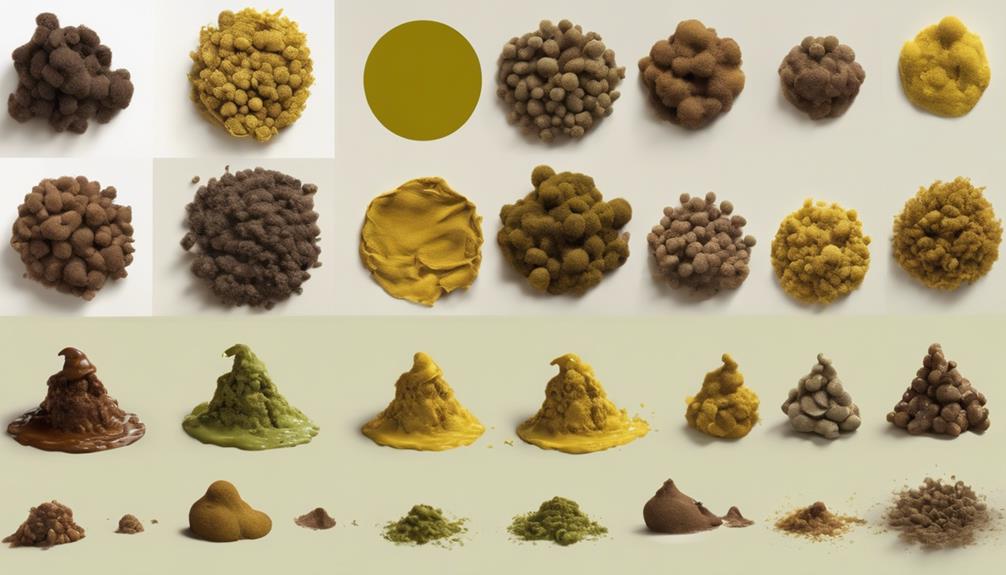So, you've entered the delightful world of parenting, where discussions about poop become as common as discussing the weather.
When it comes to deciphering the mysterious domain of brown newborn poop, our detailed guide is here to shed some light on this less-than-glamorous yet important aspect of baby care.
From the subtle nuances in color to the potential warning signs, understanding brown newborn poop is key to ensuring your little one's health and comfort.
Curious to unravel the secrets behind those tiny diapers? Stay tuned for insights that might surprise you.
Key Takeaways
- Brown newborn poop is normal in formula-fed infants, with a peanut butter-like consistency.
- Variations in color reflect diet, while mucus presence is common and indicates a healthy digestive system.
- Abnormal signs like blood, mucus, or strange textures require medical attention for proper evaluation.
- Monitoring hydration, frequency, and changes in poop characteristics are essential for overall well-being.
Brown Newborn Poop Characteristics
In newborn babies, the characteristics of brown poop, such as color and consistency, provide valuable insights into their digestive health and well-being. Brown newborn poop is a common occurrence, especially in formula-fed infants. The distinctive brown color of newborn poop is primarily attributed to bile, a fluid produced by the liver to aid in the digestion process.
Formula-fed babies typically exhibit brown stool with a peanut butter-like consistency, which is considered normal. While the shade and texture of brown newborn poop may vary slightly among babies, it generally signifies a healthy digestive system. Changes in the color of brown newborn poop can be influenced by factors such as the baby's diet and the efficiency of their digestive process.
Understanding the nuances of brown newborn poop characteristics can offer essential information about the baby's overall well-being and digestive function, enabling caregivers to monitor their health effectively.
Normal Brown Poop Variations

Brown newborn poop variations can provide valuable insights into the digestive health of infants, indicating normal digestion and nutrient absorption. The color of a baby's poop can vary based on their diet, hydration levels, and overall health. Below is a table outlining some normal variations in the color of brown newborn poop:
| Poop Color | Description | Possible Causes |
|---|---|---|
| Mustard yellow | Common in breastfed babies, indicating healthy digestion and bile production. | Breastfeeding |
| Greenish-brown | Also common in breastfed infants, can be due to the presence of bile in poop. | Digestive process |
| Dark brown | Typically seen in formula-fed babies, showing efficient nutrient absorption. | Formula feeding |
| Mucus-like | Occasional presence of mucus can be normal, but consult a doctor if frequent. | Mild irritation or infection |
Understanding these variations in brown newborn poop can help parents gauge their baby's digestive well-being and identify any potential concerns early on.
Abnormal Brown Poop Signs
Amidst the spectrum of newborn digestive health indicators, recognizing abnormal signs in the color of a baby's poop is important for early detection and intervention. When it comes to brown newborn poop, certain characteristics can signal underlying issues that require attention:
- Hard, pellet-like consistency may indicate constipation, leading to discomfort for the baby.
- Presence of streaks of blood or mucus in brown poop could suggest an infection or irritation in the digestive tract, necessitating further evaluation.
- Dark brown or black baby poop might be a sign of bleeding in the gastrointestinal tract, warranting prompt medical assessment.
- Excessive foul odor accompanying brown poop could point towards a gastrointestinal problem or potential food intolerance in the newborn.
- Unusually runny or strange-textured brown poop may be indicative of an underlying health problem that needs to be addressed promptly to guarantee the baby's well-being.
Diagnosing Brown Poop Issues

Detecting potential issues related to brown newborn poop involves a thorough evaluation of the baby's digestive health indicators. When diagnosing brown poop issues, it's important to take into account whether the baby is breastfed or formula-fed, as this can impact the color, consistency, and odor of the stool.
In breastfed babies, brown poop is typically mustard-yellow or greenish-brown, while formula-fed infants tend to have firmer, tan-colored stools. The frequency of bowel movements also plays a role in assessment. Additionally, the hydration status of the baby is important, as dehydration can lead to darker, more concentrated brown poop.
Changes in the consistency, frequency, or odor of brown newborn poop may signal underlying health concerns. While minor variations are normal, consistently watery or extremely foul-smelling poop should prompt a discussion with a healthcare provider. Monitoring the baby's overall well-being alongside their poop characteristics can help in diagnosing any potential issues effectively.
Seeking Medical Help for Brown Poop
When observing brown newborn poop, it's imperative to seek medical help if there are accompanying concerning symptoms such as blood or mucus. It's crucial to pay attention to any changes in the baby's bowel movements, as they can provide valuable insights into the baby's health.
Here are some key points to contemplate when seeking medical help for brown poop in newborns:
- Consistently watery brown poop may indicate an underlying issue that requires medical evaluation.
- Visible blood in the stool should prompt immediate medical attention to rule out any serious conditions.
- If the brown poop is accompanied by mucus, it could signal an infection or digestive problem that needs to be addressed by a healthcare provider.
- Persistent crying or signs of discomfort along with brown poop may indicate gastrointestinal distress that warrants a medical assessment.
- Regular monitoring of the baby's overall well-being, including their behavior and feeding habits, is essential to make sure their health is at its best.
Frequently Asked Questions
What Does Newborn Brown Poop Mean?
Newborn brown poop signifies a healthy digestive system processing breast milk or formula. The brown color comes from bile and bilirubin breakdown. Changes in texture or frequency may require medical attention. It varies as the baby's system matures.
What Does Unhealthy Newborn Poop Look Like?
Unhealthy newborn poop can vary in color, consistency, and content, signaling potential health issues. Pale or clay-colored stools may indicate liver problems, while blood, dryness, mucus, or frothiness can point to infections, constipation, or digestive concerns requiring medical attention.
How Do You Read Baby Poop?
We read baby poop like seasoned detectives on a case – color, consistency, and content all key clues. Brown hues signal healthy digestion and bile presence. Watch for changes, like diet impacts or digestive shifts.
Is Dark Brown Poop Healthy?
Yes, dark brown poop is healthy for newborns as it suggests proper digestion. This color is often due to bilirubin breakdown and is common in breastfed babies. If other concerning symptoms arise, it's wise to consult a healthcare provider.
Conclusion
To sum up, understanding the characteristics of brown newborn poop is essential for ensuring your baby's health.
Did you know that 90% of newborns experience changes in their poop color during the first week of life?
Monitoring your baby's bowel movements can provide valuable insights into their well-being and help you address any potential issues early on.
Stay informed and attentive to your baby's poop patterns for a healthy start in life.









